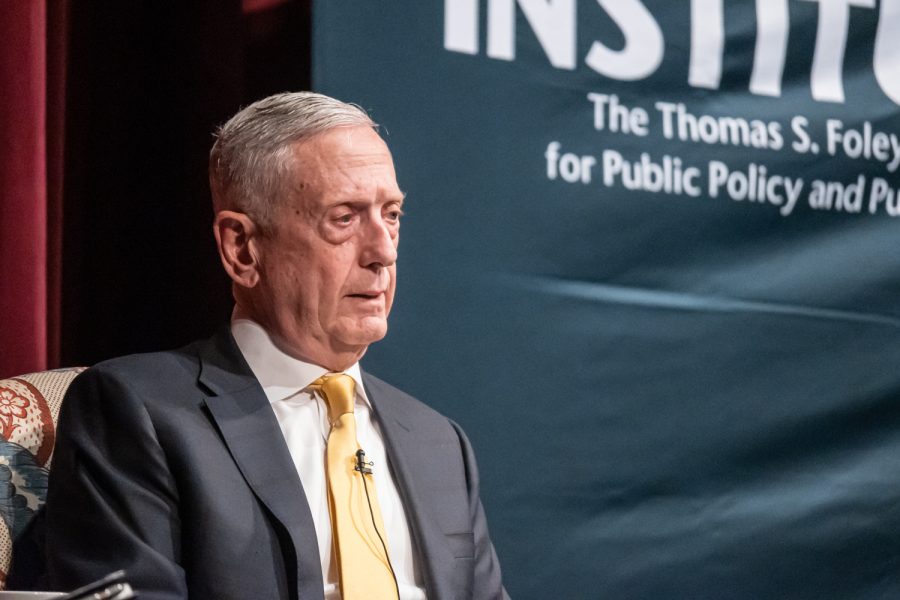Foley Talk: Dangers of blind compromise with James Mattis
Compromise may be important, but not the political silver bullet
James Mattis, former U.S. Secretary of Defense, answers questions from Cornell Clayton, director of Thomas S. Foley Institute for Public Policy and Public Service, at “Democracy at home and abroad”, March 24, Bryan Hall Auditorium.
March 25, 2022
Hosted by the Thomas S. Foley Institute for Public Policy and Public Service, James Mattis returned Thursday to speak in front of a packed Bryan Hall Auditorium. His presentation, “Democracy at home and abroad,” was also streamed and can still be accessed via the Foley Institute YouTube.
After Mattis gave an initial opening statement, he answered questions posed by Foley Institute Director Cornell Clayton and the audience. These covered topics from domestic tensions, partisan political attitudes and threats to democracy abroad.
One of Mattis’s main points was advocating for a return to compromise between political parties and respect between people, even if you disagree with them.
It certainly is a prominent issue, though at times the idea is used in our culture too holistically. You should not compromise on everything, and with certain political issues, it is important to take a stand.
That being said, Mattis was right that our country is growing increasingly divided.
There seem to be fewer and fewer things that politicians from either side of the spectrum can agree on. Everything from recent Supreme Court nominee Ketanji Brown Jackson’s confirmation hearing to policy discussions on economic recovery has become an us-against-them issue.
Of course, this is only one version of the narrative. Politicians in the government collaborate daily and healthy discourse is being done between citizens all over the country.
However, it is naive to ignore the political divide that is growing. Mattis urges us to work with people we disagree with and encourages collaboration between politicians.
While bipartisan has become a buzzword for progress and compromise, it is not the miracle cure to our country’s ailment and we should not collaborate at the expense of people’s rights and opportunities.
This is not to say that politicians and voters should not attempt to find common ground or a compromise on certain issues. For instance, common ground was readily apparent when voting for sanctions against Russia for its invasion of Ukraine in a 414-17 vote.
Compromise and middle ground on some issues is to be sought after and encouraged, although there are some issues in which you need to take a stand. If bipartisan support is the price to pay for watering down a policy to nothing or compromising on important ideals, then it is not worth it.
The recent Build Back Better Act is a prominent example of the potential dangers of compromise. Originally it was an omnibus economic recovery plan that, while having a hefty price tag, was important to bolster the struggling U.S. economy coming out of the pandemic.
The bill tackled a number of different problems that were facing the average citizen and hoped to massively expand programs across the board. However, important votes were lost from politicians fearing the price tag or the programs supported. Some of the items cut included two free years of community college, paid family leave and dental being attached to Medicare, according to NBC.
The compromise needed to actually pass the bill through Congress has stripped its effectiveness. The approved version will still have a significant impact, although not nearly as much as it could have had.
Is compromise really worth losing all that tangible legislative process?
You will never see me claiming that all compromise, all bipartisanship and attempting to find the middle ground is a bad thing. It is important for us to work together on some issues in order for this country to properly function.
But we need to be able to stand strong on some issues, especially those that have to do with citizens’ rights and opportunities. People should be able to live without having their identities invalidated by laws, or fear of harassment by government institutions.
Do not get me wrong, I am just as frustrated by the lack of action from our federal government as everyone else. This is something shared by people across the aisle for many years, seeing successive governments out of touch with communities.
If we observe a bill forced into the aegis of compromise, either stripping down its provisions or increasing them, we as the voters need to do our part and determine why. Look at the context of what is being changed and what politician is changing them. Then we can push for civic change on our side.
I agree with Mattis that the lack of compromise, respect and action in Congress is a monster, but bipartisanship is not always the silver bullet for it.









